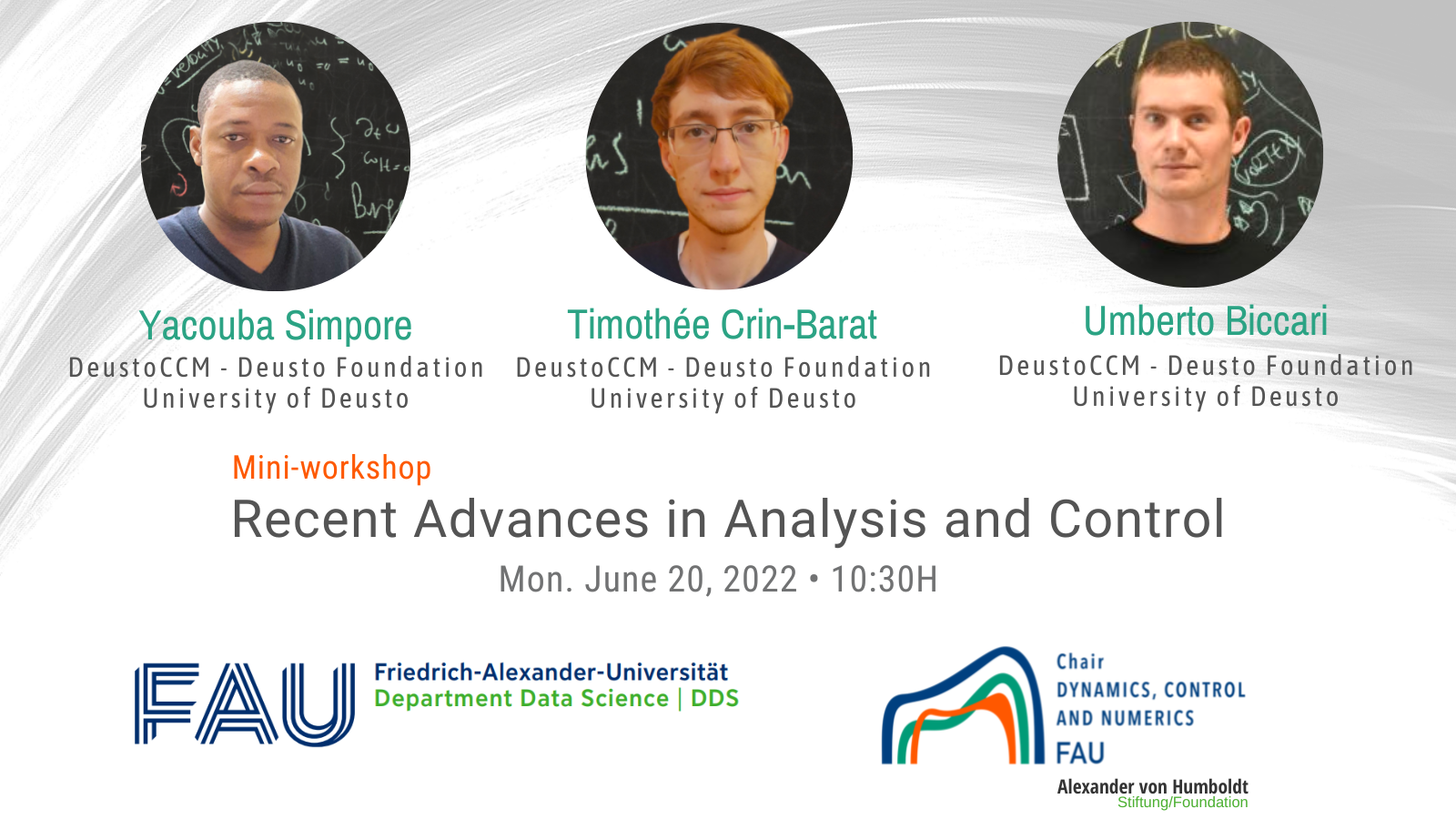
FAU DCN-AvH Mini-workshop: “Recent Advances in Analysis and Control”
Date: Mon. June 20, 2022
Organized by: FAU DCN-AvH, Chair for Dynamics, Control and Numerics – Alexander von Humboldt Professorship at FAU Erlangen-Nürnberg (Germany) – Alexander von Humboldt Professorship at FAU Erlangen-Nürnberg (Germany)
Title: FAU DCN-AvH Mini-workshop: “Recent Advances in Analysis and Control”
WHERE?
This is a hybrid event (online & on-site)
• Online: Join via Zoom meeting link
Meeting ID: 638 6874 4364 | PIN: 868401
• On site: Felix Klein building. Room 03.323
Friedrich-Alexander-Universität Erlangen-Nürnberg.
Cauestrasse 11, 91058 – Erlangen, Bavaria (Germany)
10:30H
Yacouba Simpore, visiting scientist at DeustoCCM, Chair of Computational Mathematics – Deusto Foundation/University of Deusto
“Null controllability of a nonlinear age, space and two-sex structured population dynamics model”
Abstract. In this talk, we will discuss the null controllability of a nonlinear age, space and two-sex structured population dynamics model. This model is such that the nonlinearity and the couplage are at birth level. We consider a population with males and females and we are dealing with two cases of null controllability problems.
The first problem is related to the total extinction, which means that, we estimate a time T to bring the male and female subpopulation density to zero. The second case concerns null controllability of male or female subpopulation. Since the absence of males or females in the population stops births; so, if we have the total extinction of the females at time T, and if A is the life span of the individuals, at time T+A one will get certainly the total extinction of the population. Our method uses first an observability inequality related to the adjoint of an auxiliary system, a null controllability of the linear auxiliary system, and after the Schauder’s fixed point theorem.
11:00H
Timothée Crin-Barat, DeustoCCM Chair of Computational Mathematics – Deusto Foundation/University of Deusto
“Asymptotic analysis of partially and locally dissipated hyperbolic systems”
Abstract. In this talk, I will start with a quick introduction on partially dissipative systems and recall some classical and new results. Then I will present a new result obtained in collaboration with Nicola de Nitti and Enrique Zuazua concerning the case where some regions of the space are locally undamped. In the one-dimensional linear case, we recover the usual decay rates of the solution delayed by the time each characteristic spent in the undamped regions. Some extensions will be discussed briefly.
11:45H
Umberto Biccari, DeustoCCM Chair of Computational Mathematics – Deusto Foundation/University of Deusto
“Multilevel control”
Abstract. We discuss the multilevel control problem for dynamical systems, consisting in designing a piece-wise constant control function taking values in a finite-dimensional set. We start by providing a characterization of multilevel controls through an optimal control approach, based on the minimization of a suitable cost functional. We do this by focusing on the Selective Harmonic Modulation problem in power electronic engineering, a practical application of multilevel control, which is what motivates our study [1,2]. In a second moment, we address the problem of multilevel control for linear ODE systems fulfilling the Kalman rank condition for controllability [3].
References:
[1] D. J. Oroya-Villalta, C. Esteve-Yagüe and U.B., Multilevel Selective Harmonic Modulation via optimal control, 2021.
[2] U.B. and E. Zuazua, Selective Harmonic Modulation by duality, 2021.
[3] U.B. and E. Zuazua, Multilevel control by duality, 2021.
Previous FAU DCN-AvH Workshops:
- Mini-Workshop “Calculus of Variations and Functional Inequalities” by König, Glaudo (May 25th, 2022)
- Mini-workshop: “Model Reduction and Control” by Peitz, Manzoni, Strazzullo (May 24th, 2022)
- Seminar Series: Deep Learning in Control by Heiland (January 17th, 2022)
- Mini-workshop: “Recent Advances in Analysis and Control” by Lazar, Zamorano, Lecaros (January 14th, 2022)
- Mini-workshop: “Recent Advances in Analysis and Control” by Ftouhi, Rodríguez, Song, Matabuena (October 1st, 2021)
- Mini-workshop: “Recent Advances in Analysis and Control” (II) by Sônego, Minh Binh Tran (May 21th, 2021)
- Mini-workshop: “Recent Advances in Analysis and Control” by Della Pietra, Wöhrer, Meinlschmidt (April 30th, 2021)
If you like this, you don’t want to miss out our upcoming events!


